| |
Edgefest
2004
Ann Arbor MI, 13-16 October 2004
by David Dupont
November 2004
Edgefest in Ann Arbor, Michigan is an avant-garde jazz Brigadoon.
Walking into the Kerrytown Concert House, the same folks are settling
into the same seats as they were just over a year ago, and as they
have been in the six years I've been making the trek up here. And
even the leader of the band ready to take the stage was familiar.
Guitarist James Emery had been here last year with the String Trio
of New York. In fact, Edgehead-in-chief David Lynch likes to present
musicians in different formats. This year he presented Emery leading
his own quartet featuring ace reedman Marty Ehrlich with the rhythm
team of bassist Drew Gress and percussionist Kevin Norton.
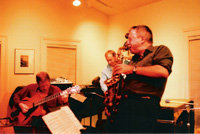 |
|
(Left to right) James Emery, Drew Gress, Marty
Ehrlich
(© David Dupont)
|
Despite the different instrumentation the quartet takes a similar
approach as the more famous—as much as any ensemble in this genre
can be called famous—trio. The group features a balance between
compositions, including some switchback ensemble passages, and free
blowing. Emery made a point of spelling out the structures of the
tunes in casual way that seemed fitting for a concert space that used
to be the living room of the 150-year-old house turned into a concert
venue and art gallery.
On the opener "Arc Into Distant Night", Ehrlich, who was
making his festival debut, earned his keep. Blowing alto saxophone,
he took a figure down the ladder, twisting it lower. And on the closer,
"The Pursuit of Happiness", he pushed his clarinet to the
limit with some high energy blowing. My notes say it all—"damn!"
In between, the quartet traversed a variety of moods, including the
aptly named "Down Home Tone Poem" with its amorphous four-way
collective jam and the waltzing "Black Diamonds and Pink Whispers".
The leader played characteristically cogent work, the high point being
some piquant avant-Delta guitar on "Cobalt Blue".
While this was a fine way for me to open the festival, in truth, the
music had started the night before with Edgefest extending into a
Wednesday night for the first time with a performance by Jim Black's
Alasnoaxis. Alas, for myself, facing yet another 130-mile commute
proved too daunting, so I missed this as well as a few other sets.
In a fairy tale land, of course, I'd be light and lively for every
set, and fly home every night on a magic carpet of sound. Not so.
Real life intrudes. All the more reason to savor the sounds I was
able to catch.
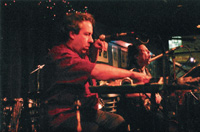 |
|
(Left to right) Jean Derome, Joane Hetu
(© David Dupont)
|
But Thursday I'm ready to make the short six-block walk to the Firefly
Club, a cozy nightspot in the heart of Ann Arbor's downtown. Opening
the two-band show was Nous Percons les Oreillles (We Pierce the Ears)
featuring Jean Derome and Joane Hetu. Derome's appearance is an example
of how festival producer David Lynch likes to work. In 2002, Derome
was at the festival with two different groups. In 2004, he returned
with a third aggregation, a duo with his wife. Together they delivered
their own brand of urban bohemian folk music. Their sounds seemed
rooted in the urbane detritus of a cosmopolitan household. They both
sing—she in a powerful, malleable voice and he in a rich, but
unaffected voice. They both play saxophone, though on this night the
saxophone playing seemed more of an emulsifier than the key ingredient.
Derome adds a toy chest full of little instruments—toys, whistles,
animal calls, which the duo brought together in odd, whimsical combinations.
Sometimes their singing seemed to be emanating from a church. Or on
one number, Hetu produced gagging sounds as if she had something lodged
in her throat. It had the audience on edge, caught in that odd place
wondering whether this was to be taken seriously. I smiled, and breathed
a sigh of relief when Hetu's voice suddenly rang free. Following the
piece, Derome explained the text. Sure enough, it was about having
something caught in the throat. Yet this was more than the reprise
of an unfortunate scene one might witness at the dinner table. Even
at her most strangled gagging, the overtones in Hetu's voice resonated.
"We're from Montreal", Derome said. "This is the kind
of music we do." Not everywhere, he added dryly. "So you
can visit." At one point between numbers, the bar's ice machine
clattered—an aberration, the Firefly is very solicitous of performers.
"The ice is nice", Hetu commented, thinking I suspect about
how it could be integrated into the music. The duo closed its set
with a game of avant-garde patty-cake, beating hands together while
singing a simple four-bar, nursery-song like phrase. That little melodic
nugget stayed lodged in my ear during the break between shows.
Next up was What We Live, a trio of saxophonist Larry Ochs, bassist
Lisle Ellis, and drummer Donald Robinson with special guest vocalist
Saadet Turkoz. The performance was bifurcated. I never really felt
the two entities, the free jazz trio and the Central Asian laments.
Turkoz has a powerful voice and the presence of an actress. She projected
the emotional nuances of the narrative in a way that communicated
even if the words were in an alien language. Her voice was at once
clear and unaffected, and then suddenly clouded as if by age, a reflection
of the characters embodied in the song. And she could make the overtones
ring out in full multiphonic splendor when she wanted.
But these seemed set pieces, apart from what the trio was doing. Robinson's
subtle, yet insistent percussion provided the link between the disparate
parts. Only on the last piece did the ensemble seem to jell. Ochs'
sopranino evoked some kind of ancient flute sounding over the steppes,
and Ellis played fitting lyrical counterpoint under Turkoz' lament.
It would have been a fine starting point.
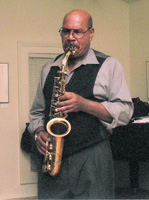 |
|
Sonny Fortune
(© David Dupont)
|
The Friday night appearance of the duo of Sonny Fortune on alto saxophone
and legendary free drummer Rashied Ali was the big draw of the festival.
Demand was such that a second show had to be added to accommodate
all those who wanted to hear the duo. That unfortunately meant those
like myself who attended the late show missed the quartet of Hetu,
Myra Melford, Andrea Parkins, and Jenny Scheinman, assembled just
for the festival.
The spirit of John Coltrane hovered over the Fortune-Ali performance.
Fortune is a devotee of the early-1960s period Coltrane, the time
before Ali was added to the quartet. He delivered a version of "Impressions"
that lasted over an hour. Using relentless streams of modal figures,
he'd build to a climax. After each climax, he'd fashion what sounded
like a new melody head and use that as a launching pad for another
ten minutes or more of cascading scales. Sometimes he'd stagger backward
as if pushed by the force of his own blowing.
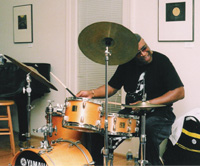 |
|
Rashied Ali
(© David Dupont)
|
Underneath, Ali fashioned a swirling mandala of rhythm. He extended
the meter into eight-bar phrases, accenting down the piece's structure
with exclamation marks. He sometimes would quote from the ensemble
passages of Coltrane's own classic versions of this tune with a snare
drum accent, two contrasting cymbal crashes, and then a rim shot on
the snare. When after about an hour Fortune stepped aside, Ali built
a solo that elaborated on all he'd been playing before. At one point
he played a bit of call and response between different parts of his
kit. At another he slipped in a bit of funk. It was Ali's playing
that kept me engaged during Fortune's endless choruses. Fortune closed
with the ballad "What's New". Frankly, though, I felt a
little staggered myself, and while I enjoyed the contrast, I wasn't
able to summon the concentration the piece demanded.
A quick walk to the Firefly helped revive my brain. The place was
packed and still buzzing from the previous show. No one was moving,
so we late arrivals had to lay claim to spots against the back wall
and bar rail for Scheinman's Shalagaster with Melford, trumpeter Ron
Miles, bassist Todd Stickafoose, and drummer Mark Ferber. Scheinman's
piquant elegance proved a welcome tonic to Fortune's musical assault.
"American Dipper" was a gently pulsating groove that inspired
Melford to create a ringing solo. "Tango for Luna" elicited
a long-lined, swirling solo from Miles with half-valve effects that
seemed to evoke his namesake. The music, though as wonderful as it
was, couldn't compensate for the late hour and sore back, so I regretfully
beat an early exit.
I arrived back at the concert house the next night early to secure
prime seats for Trio X with the opening act of Danish saxophonist
Lotte Anker with Americans drummer Gerald Cleaver and pianist Craig
Taborn. Something was amiss from the start. The house drum kit sat
on stage with no cymbals in place. I noted this and waited as concert
time approached. About the time the trio was scheduled to hit, Lynch
arrived on stage. He had just learned that Anker, traveling from a
concert the night before in Toronto, had been stopped at the border
at Windsor and refused entry into the United States. Her rhythm team
had stayed with her for three hours of bureaucratic haggling. (Despite
implications that she'd been stopped for political reasons, a la the
former Cat Stevens, it turned out her work papers were deemed not
in order, which, of course, may just be a pretext for the former.)
Taborn and Cleaver had now settled her into a motel and were on their
way to Ann Arbor.
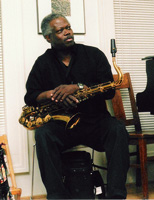 |
|
Joe McPhee
(© David Dupont)
|
Meanwhile Trio X, then enjoying the fare at one of the city's eateries,
was being summoned to play the first set. Lynch promised the audience
a show shortly. Soon McPhee, bassist Dominic Duval, and drummer Jay
Rosen arrived and, before a full house, got ready to play. The concert
house is an intimate venue in any case, with listeners in the front
rows close enough to be members of the band. This camaraderie was
especially pronounced as Rosen, Duval, and McPhee got ready to play.
Again the venue seemed more like the living room it once had been.
Lynch delivered water to them, and they wondered if maybe something
more potent was available. So glasses of white wine—in stemware
even—soon arrived on stage. Well, they should feel at home.
This was the group's second visit to the festival. A year after the
band's inception in 1999, they played a high-energy show here. Five
years later when they are—despite the vagaries of the free music
scene—still a going concern, they returned for a quite different
show. Someone suggested "Stella By Starlight" when the lights
were lowered at McPhee's request. "What version should we play?"
asked McPhee, who was sitting on the side of the stage chatting with
fans as Rosen and Duval got settled. The version was the slow one,
the very slow one with McPhee gliding along the edges of the melody.
Rosen cushioned the lead with a wash of cymbals.
 |
|
Dominic Duval
(© David Dupont)
|
Their entire set seemed a three-way conversation on the nature of
beauty. Ballads in various guises dominated. The spirits of Ornette
Coleman's "Lonely Woman" and the spiritual "Motherless
Child" were summoned in the second number. And the closer was
a version of "Going Home"—"We're going to steal
from Dvorak", McPhee told the audience. "We steal from everybody.
We steal from everything." Even the middle number, a tribute
to Bill Dixon, was a nod to the theme of the band's current tour.
"Trio X: October Revolution 2004/The Journey Continues",
opened with airy, subdued flugelhorn, and later McPhee (on tenor)
seemed on the verge of slipping into "My Funny Valentine".
A surprising set perfectly in tune with the moment.
Cleaver and Taborn arrived after they too made a pit stop for food
(at Zingerman's, an Ann Arbor landmark and one of the festival many
sponsors). Again their setup was in full view of the audience, and
they played on that. Cleaver started testing a cymbal stand, and Taborn
adjusted his bench and the music stand on the house's vintage Steinway.
Soon listeners clued into their intent. The set had started as they
crafted these "extraneous" sounds into musical patterns.
Both are festival favorites. Cleaver is a Detroit native, Taborn graduated
from the University of Michigan, and both first emerged on the Southeastern
Michigan scene. They've played Edgefest in a variety of contexts;
indeed, they've each probably made more primetime festival appearances
than just about anyone. And I for one have always been impressed.
This would prove to be their most challenging assignment, creating
a show on the spur of the moment as two-thirds of a trio. Their way
of easing into the set, taking the soundings of their instruments,
proved an apt opening. The quiet of the opening also proved to be
an aberration. The opening number grew in intensity until they were
roaring to the beat of the industrial jungle.
Taborn is most known for his work with electronic keyboards, but here
he showed he knows how to take advantage of the full resources of
a gorgeous acoustic instrument. His playing resonated with chromatic
waves of sound that rolled and crashed on the harmonic beaches. His
left hand was restless, rushing underneath. On the closing number
he laid out a fearsome stride accented by clusters. Cleaver complemented
all this, responding in kind with a variety of percussive color. Then
on the second number, he exploded with a slamming drum solo. Their
short set proved to be the hardest-edged, most uncompromising work
of the festival. What followed across the street in the upstairs of
a stationary store was certainly the most accessible.
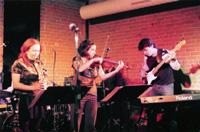 |
|
(Left to right) Marie-Chantal Leclair, Marie-Soleil
Belanger, Nicolas Masino of Miriodor
(© David Dupont)
|
The theme of the night seemed to be return appearances, with the Montreal
prog-rock band Miriodor back four years after their last appearance.
The band has expanded to a sextet. It wove together bright intertwining
figures with a spontaneous spark. Improvisation plays a relatively
minor part in the music, but the band had a herky-jerky breakdown
and brief solos by Marie-Chantal Leclair and violinist Marie-Soleil
Belanger that that colored "Deep Forest". Miriodor plays
with the kind of ensemble verve one expects from a band that's been
around for about two decades, and still includes two founding members,
drummer Remi Leclerc and keyboardist Pascal Globensky. Along with
guitarist Bernard Falaise and bassist/keyboardist Nicolas Masino,
they served up a fitting dessert with which I concluded my festival
attendance. (Composer and saxophonist Patrick Zimmerli was playing
a midnight set at the Firefly, but there had been too may long nights
already and the road back home from Ann Arbor seemed to be getting
longer each night.)
So how did Edgefest 2004 stack up? The festival is always a high point
of my year, and this year was no exception. As usual the variety of
acts that fell under the cover of the festival's large umbrella
was impressive. I suspect the strongest images I'll retain from this
festival will be Rashied Ali's torrential drumming, the fine balance
of James Emery's quartet, the out-lyricism of Joe McPhee, and those
few fleeting moments of Jenny Scheinman's Salagaster. Those are the
kind of memories that will keep me in anticipation of next year's
festival.
|
|
|
|
|

